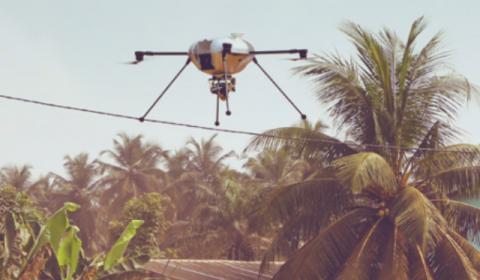
Drone Technology: Boots on the Ground or Eyes in the Sky?
Boots on the ground or eyes in the sky? Don’t shoot! It’s not a spy. Drones are here to rewrite how we monitor construction sites. Would you rather send out a drone to capture images or tether a human to a steep sloped roof while juggling a camera? OSHA seems to be in favor of drone use. We say, bring on the drones, but with a few caveats. It’s a new technology so it’s wise to be somewhat skeptical.
This past fall at the BV Forum , we had the opportunity to discuss drone technology in the construction industry with featured speaker and construction management professional Mike Korman of Right Stuff Drones. For the average Joe, drones are easy to purchase for recreational enjoyment. However, for those wanting to use drones commercially, it’s a different story. According to Korman, it has challenges, including the need to be familiar with FAA regulations, licensing, and privacy protection laws (keeping those with shotguns at bay). For those determined professionals willing to invest the time, Korman believes commercial drone use can provide great ROI for commercial construction. Other industry analysts agree.
“For builders, the case for return on investment is straightforward. Drones are cheaper to fly than manned aircraft and faster than human surveyors, and they collect data far more frequently than either, letting construction workers track a site’s progress with a degree of accuracy previously unknown in the industry.” (Fortune.com, The Construction Industry is in Love with Drones)
Drones can provide detailed information in a way that that the construction industry hasn’t seen before. Let’s look at some of the applications according to Right Stuff Drones :
- Building, Structure & Industrial Inspections
- Project Planning
- Progress Monitoring
- Surveying
- Panoramic Photos
- Plan Overlays
- Feature Extraction
- GIS | CAD Data Integration
- Site Maps and Measurements
- Aerial Data Collection
THE RIGHT FIT FOR YOU? A FEW PROS AND CONS
Are drones the right fit for every construction monitoring project? 2017 is the year that will likely produce tangible data on ROI as practical use increases. To stay competitive, we predict that more and more companies will turn to this developing technology. Here are a few of my thoughts on trends and practical applications for drone use in the construction industry:
- It‘s an easy and quick way to get eyes on a project from a different perspective
- Best way to collect real time aerial images, map 2D and 3D models vs Google Earth
- It provides a high level of detail while capturing images from several angles
- It can be integrated with a software project management tool (ProTrack), providing real-time updates
- Video technology dropped into ProTrack per site
- Google mapping technology per site
- Up-to-date/live images vs. Google images – which can be dated
- Safety benefits – no need to place a person on a roof or other difficult to access location
- Shows progress to clients in an exciting new format/perspective
- Technology and scale are improving and will continue to do so
DRONE VS PROJECT MANAGER
Evolving technology will always be met with skepticism and here are some of the biggest concerns and questions we’ve heard:
- Drone operator’s lack of understanding of key points to assess while onsite
- Drone operator’s lack of understanding of construction anomalies
- How will the drone operator know what to look for without a project manager looking over his shoulder?
- Scalability of drone use in construction management and monitoring
- Will the technology progress at a rate that provides answers more quickly than an onsite project manager?
- Will one drone be enough at a complex site?
- Will multiple drones be needed and how will that affect the cost for assessments and monitoring?
- Drone use is still a line item on the budget vs. sending out a project manager. A project manager has intimate familiarity with the project and can address store/operator concerns, contractor issues, assess budget, schedule, and quality impacts. A drone operator is just a “technical expert.”
- Regulations are still developing and vary by state and municipality.
- What are the risks to the client if the operator is not properly licensed?
- Determining when a drone should be utilized
- Which organizations and project types would benefit the most?
Time will tell if drone use is here to stay in the construction industry. Boots on the ground or eyes in the sky? What are your thoughts? Contact us here!